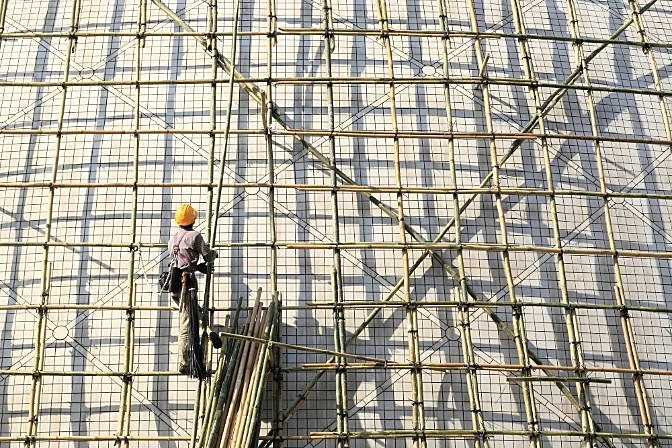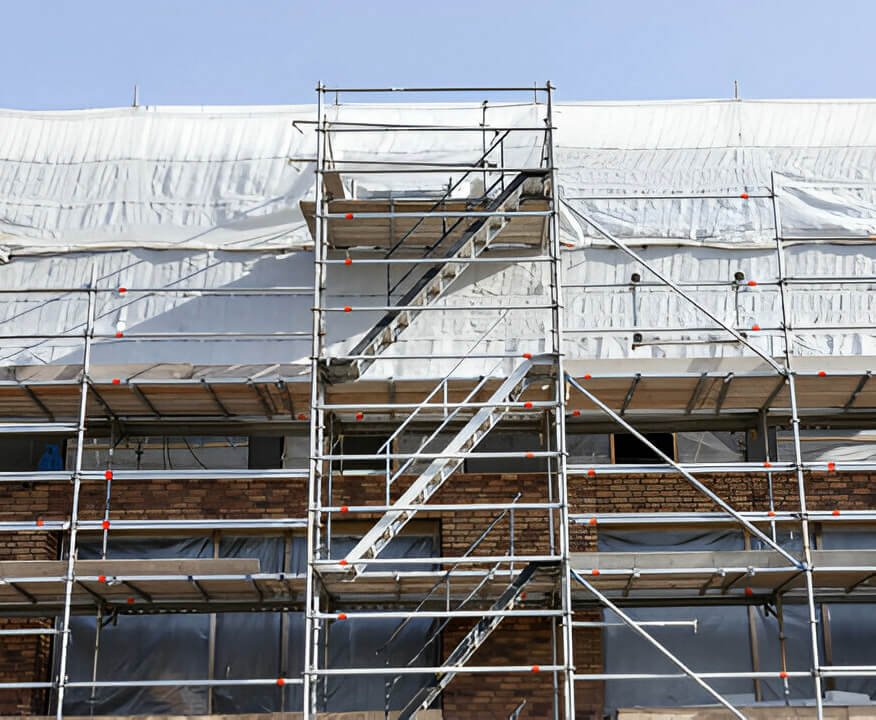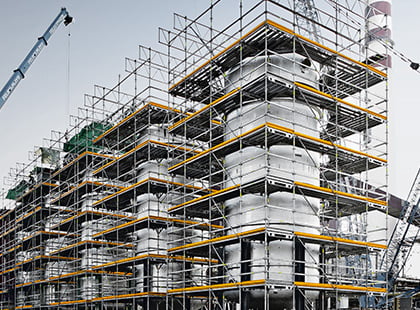Professional Scaffolder Surrey: Your Trusted Partner for Safe Installations
Professional Scaffolder Surrey: Your Trusted Partner for Safe Installations
Blog Article
Discovering the Various Kinds Of Scaffolding Used in Building And Construction Tasks
The construction market relies heavily on various sorts of scaffolding to satisfy particular job demands, each offering distinct advantages and applications. Typical frame scaffolding offers a sturdy foundation for basic tasks, while suspended scaffolding is necessary for deal with skyscraper structures. Other choices, such as system and rolling scaffolding, deal with performance and wheelchair, specifically. The cantilever alternative shows very useful in city atmospheres where room is constricted. Recognizing the nuances of these scaffolding types is important for enhancing safety and performance on construction websites, prompting a more detailed exam of their one-of-a-kind characteristics and applications.

Typical Framework Scaffolding
Standard structure scaffolding is just one of one of the most extensively made use of approaches in the building sector as a result of its robustness and flexibility. This system contains straight and upright frameworks that are assembled to create a steady platform for materials and employees. The main components include upright articles, straight journals, and diagonal braces, which together supply a solid framework that can sustain significant lots.
Among the crucial benefits of conventional framework scaffolding is its versatility to different construction projects, varying from domestic buildings to big commercial structures. The modular layout permits very easy setting up and disassembly, making it reliable for both lasting and short-term tasks. Furthermore, the system can be personalized in height and size, accommodating different structure designs and website problems.
Safety and security is vital in scaffolding applications, and standard frame systems are outfitted with guardrails and toe boards to stop drops and make certain worker protection. Routine assessments and adherence to safety and security regulations are critical in preserving the honesty of the scaffold (Scaffolding). Overall, traditional structure scaffolding stays an essential option in the construction industry, providing a trusted system for labor and enhancing overall job effectiveness

Suspended Scaffolding
Put on hold scaffolding supplies a special service for building and construction jobs that require accessibility to raised surfaces, especially in circumstances where traditional framework scaffolding might be not practical. This sort of scaffolding is commonly put on hold from the roof covering or upper levels of a framework, using a system of wheels, ropes, and systems to develop a working room that can be adapted to different elevations.
Among the primary advantages of suspended scaffolding is its versatility. It can be quickly repositioned or decreased to accommodate modifications in building and construction requirements, making it excellent for jobs such as window installation, frontage job, and maintenance on high-rise buildings. Additionally, the marginal footprint of put on hold scaffolding permits better use ground space in city atmospheres, where area is typically limited.
Safety is an essential factor to consider in the use of suspended scaffolding. In general, suspended scaffolding gives a effective and efficient service for accessing hard-to-reach areas in numerous building and construction scenarios, boosting both efficiency and security on site.
System Scaffolding
System scaffolding, commonly considered a modern solution in the click this scaffolding industry, contains pre-engineered elements that can be promptly constructed and adapted for various construction projects. Scaffolding. This kind of scaffolding is characterized by its modular layout, which enables flexibility and performance on work websites, accommodating various elevations and structural demands
Typically made from high-strength steel or aluminum, system scaffolding offers improved longevity and security. The parts include vertical blog posts, horizontal ledgers, and angled braces, which adjoin securely, making sure a durable framework. The style commonly incorporates standard installations, simplifying setting up and disassembly procedures, thereby lowering labor time and prices.

Rolling Scaffolding
Rolling scaffolding is a functional choice to conventional set scaffolding, made for mobility and ease of use on building websites. This kind of scaffolding contains a platform sustained by frameworks with wheels, allowing workers to quickly relocate it as required. The flexibility feature considerably enhances performance, as it decreases downtime connected with disassembling and setting up fixed scaffolding.
Generally created from lightweight materials such as light weight aluminum scaffold yard for sale or steel, rolling scaffolding provides a tough yet portable solution for tasks requiring regular repositioning - Scaffolding. It is particularly helpful in tasks such as paint, drywall setup, and electrical work, where access to numerous elevations and areas is required
Safety is vital in rolling scaffolding style, with features such as locking wheels to stop unintended activity when in operation, and guardrails to safeguard workers from drops. Additionally, lots of models are flexible in height, suiting different project needs.
Cantilever Scaffolding

The layout of cantilever scaffolding usually involves utilizing arms or braces secured to a structure or structure, making it possible for the system to extend exterior safely. Safety is critical; hence, these scaffolds need to be crafted to hold up against environmental conditions and various lots. Regular assessment and maintenance are vital to ensure architectural integrity and worker safety and security.
Cantilever scaffolding is favored for its versatility and reliable use area, making it a preferred option in city environments where room restraints prevail. Moreover, it facilitates easier accessibility to high altitudes, ultimately adding to the total effectiveness of building tasks. Just like all scaffolding kinds, correct training and adherence to security standards are crucial for employees utilizing cantilever scaffolding.
Verdict
Finally, the varied sorts of scaffolding made use of in construction projects each serve distinctive functions tailored to certain site demands. Typical structure scaffolding offers stability, while suspended scaffolding offers adaptability for elevated jobs. System scaffolding helps with fast assembly, and rolling scaffolding enhances movement for varying job atmospheres. Cantilever scaffolding properly deals with challenges in metropolitan setups. Comprehending these scaffolding kinds is important for maximizing safety and performance in building and construction, ultimately adding to the successful completion of projects.
Conventional structure scaffolding gives a strong foundation for general tasks, while put on hold scaffolding is vital for job on skyscraper frameworks.Moving scaffolding is a flexible choice to conventional fixed scaffolding, created for movement and convenience of usage on construction websites. As with all scaffolding kinds, proper training and adherence to safety requirements are essential for workers making use of cantilever scaffolding.
Typical framework scaffolding supplies stability, while suspended check it out scaffolding offers flexibility for raised tasks. System scaffolding helps with fast assembly, and rolling scaffolding improves wheelchair for varying work settings.
Report this page